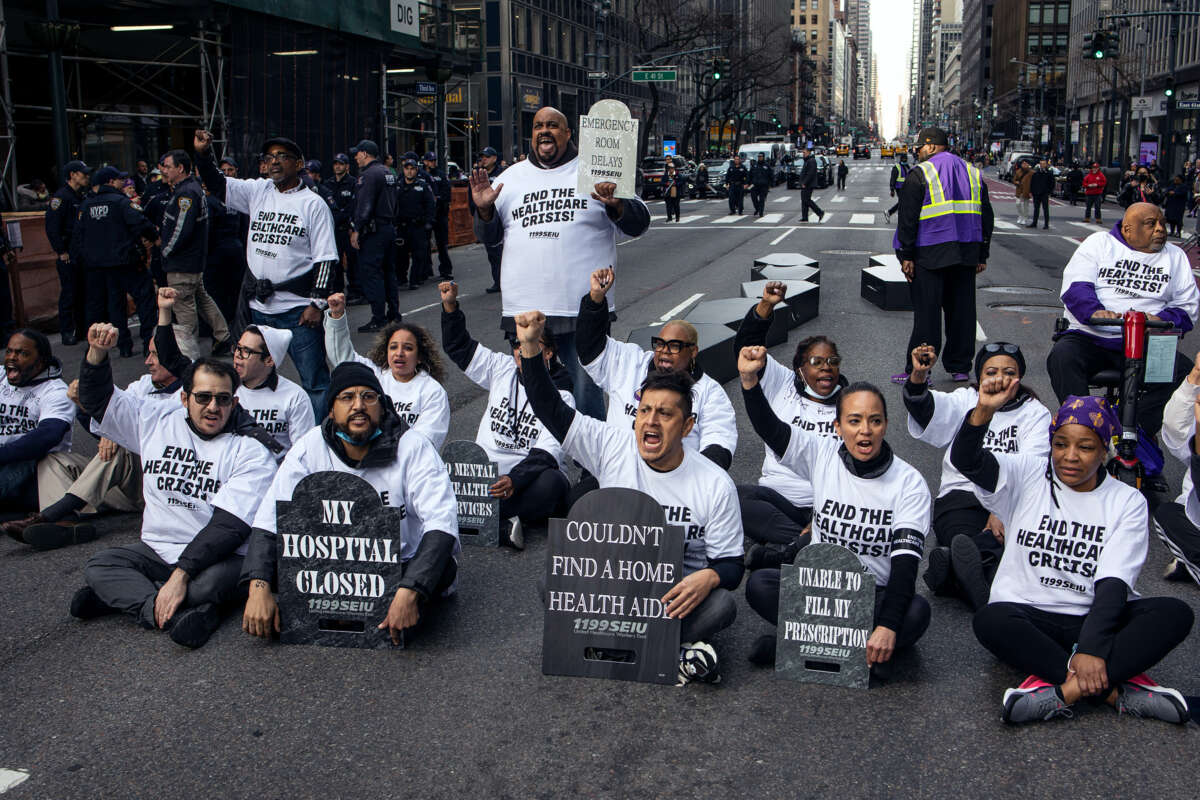Truthout is a vital news source and a living history of political struggle. If you think our work is valuable, support us with a donation of any size.
Policy analysts and Democratic lawmakers raised alarm over the weekend at a leaked document indicating that House Republicans intend to pursue massive cuts to Medicaid, a program that provides sometimes lifesaving coverage to roughly 80 million people across the United States.
Near the top of a list of “spending reform options” that House Republicans are considering to help finance additional tax cuts for the rich and large corporations are proposals that would strip Medicaid coverage from millions of Americans, including children, seniors, and people with disabilities.
One of the changes listed in the leaked document, obtained by Politico last week, would convert Medicaid’s funding structure to a “per-capita cap,” under which the federal government would only provide states with a fixed amount of funding for each beneficiary rather than paying a percentage of states’ overall Medicaid costs.
The document, which reportedly comes from the House Budget Committee, suggests the reform would result in up to $918 billion in cuts over a 10-year period.
Edwin Park, a research professor at the Georgetown University McCourt School of Public Policy’s Center for Children and Families, noted in a blog post that such a change would “radically restructure Medicaid financing.”
“These funding caps are typically designed to fail to keep pace with expected growth in healthcare costs in order to severely cut federal Medicaid spending, with those cuts growing larger and larger over time,” Park wrote. “Moreover, the caps would also fail to account for any unexpected cost growth such as from another public health emergency or a new, costly drug therapy, which would make the federal funding cuts even larger than originally anticipated.”
The Center on Budget and Policy Priorities warned in an analysis published last week that cuts to federal funding under a per-capita cap “would impose significant strain on states and put millions of people at risk of losing benefits and coverage.”
The document also includes a call to “Equalize Medicaid Payments for Able Bodied Adults” — a proposal seen as an indication that the GOP plans to go after the Affordable Care Act’s Medicaid expansion — and confirms that Republicans intend to push for Medicaid work requirements, which have proved disastrous in the states that have tried such mandates.
Park argued that work requirements — and the “onerous red tape” they entail — would amplify the harms of cuts to federal Medicaid funding.
“As a result, these proposals would take away coverage and access from tens of millions of low-income children, families, seniors, people with disabilities, and other adults who rely on Medicaid,” Park wrote. “Moreover, because Medicaid is the largest source of federal funding for states — accounting for 56.1% of all federal funding for state budgets in 2024 — these large cost-shifts to states would also threaten deep, damaging budget cuts to other state spending including for K-12 education.”
Overall, the leaked Republican document proposes up to $5.7 trillion in spending cuts over 10 years — with Medicaid cuts making up $2.3 trillion of that total — as President-elect Donald Trump pushes for a sprawling reconciliation bill that includes another round of tax cuts that would disproportionately benefit the wealthiest Americans.
In addition to Medicaid cuts, the House GOP policy menu calls for slashing Temporary Assistance for Needy Families and federal nutrition assistance, repealing “major Biden health rules,” and eliminating renewable energy funding under the Inflation Reduction Act.
“This won’t lower costs for Americans,” Rep. Mike Levin (D-Calif.) wrote in response to the GOP document. “These cuts would only help bankroll Trump’s tax cuts for his billionaire friends and corporate interests.”
Sen. Ron Wyden (D-Ore.), the top Democrat on the Senate Finance Committee, said the leaked policy list shows that “Republicans are gearing up for a class war against everyday families in America.”
“This list outlines a plan to increase child hunger, boot tens of millions off their health insurance, and lay off hundreds of thousands of clean energy workers to fund tax handouts for the wealthy,” said Wyden. “It won’t be any consolation to struggling Americans that their hardship allows some rich buddy of Donald Trump’s to buy a bigger yacht.”
Holding Trump accountable for his illegal war on Iran
The devastating American and Israeli attacks have killed hundreds of Iranians, and the death toll continues to rise.
As independent media, what we do next matters a lot. It’s up to us to report the truth, demand accountability, and reckon with the consequences of U.S. militarism at this cataclysmic historical moment.
Trump may be an authoritarian, but he is not entirely invulnerable, nor are the elected officials who have given him pass after pass. We cannot let him believe for a second longer that he can get away with something this wildly illegal or recklessly dangerous without accountability.
We ask for your support as we carry out our media resistance to unchecked militarism. Please make a tax-deductible one-time or monthly donation to Truthout.
